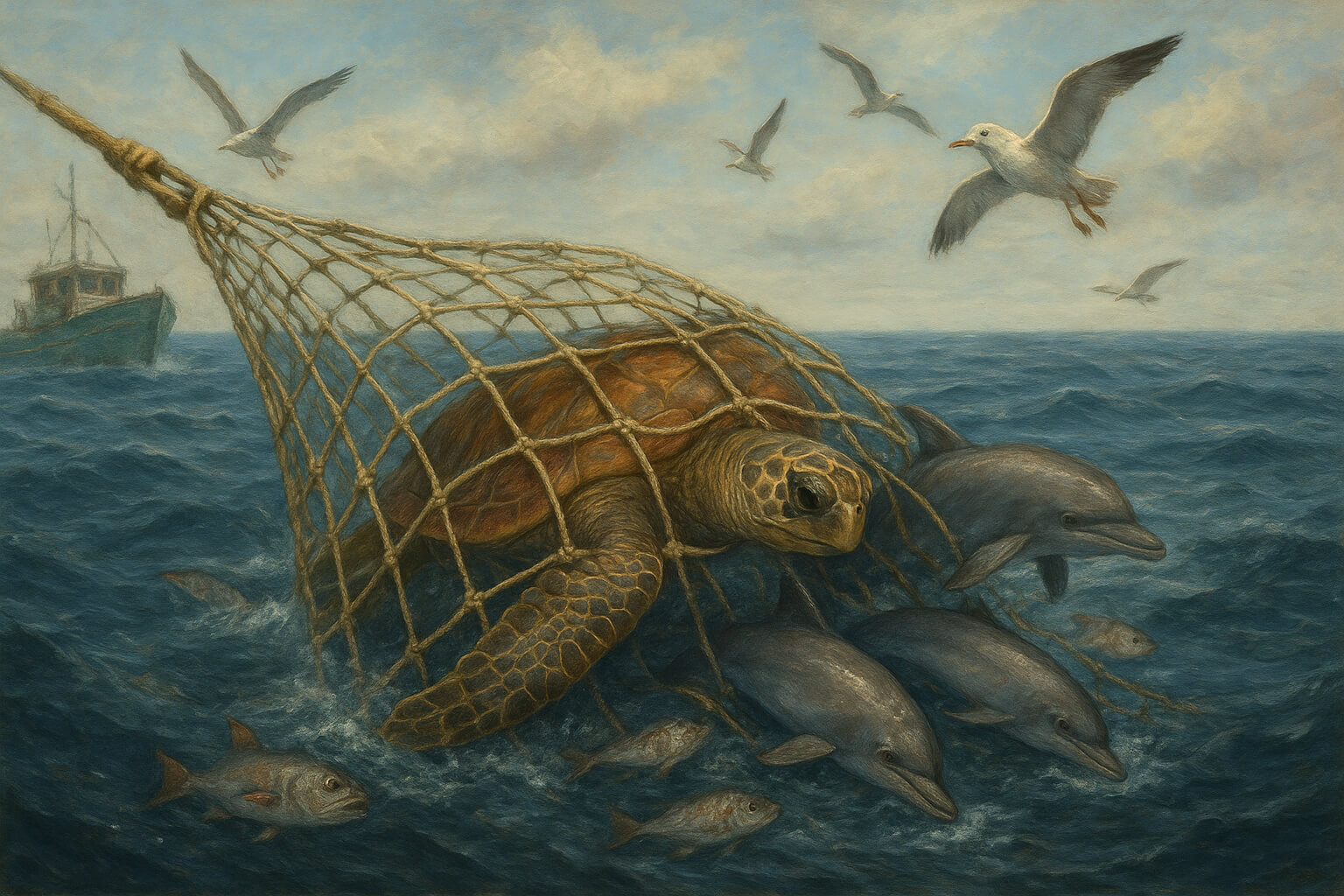Bycatch, the unintended capture of non-target species such as dolphins, turtles, seabirds, and juvenile fish, is a major threat to marine biodiversity. Despite the essential role fishing plays in providing food and livelihoods across the globe, unsustainable fishing practices are causing irreparable harm to the delicate ecosystems of our oceans.
What is Bycatch?
Bycatch occurs when fishing gear, such as nets, longlines, and traps, inadvertently captures animals that were not the intended target. This non-selective process leads to the harm, injury, or death of marine species, many of which are already vulnerable. Common bycatch victims include:
- Sea turtles that become entangled in fishing nets.
- Sharks and rays, which are often caught on longlines.
- Seabirds, which can become trapped on fishing hooks.
- Juvenile fish that are caught before they have a chance to mature and reproduce.
The Food and Agriculture Organization (FAO) estimates that millions of tons of bycatch are discarded annually, highlighting the scale of the problem. Bycatch is not just a loss for the species involved but also a critical driver of marine population decline.
Consequences for Marine Ecosystems
Bycatch has far-reaching ecological consequences that go beyond the individual loss of species. The removal of non-target species disrupts vital marine ecosystems, with consequences for both biodiversity and the health of the oceans:
- Population Decline: Species like sea turtles, dolphins, and certain fish populations face significant declines due to frequent bycatch incidents. These animals play important roles in marine ecosystems, and their loss can have cascading effects.
- Food Chain Disruption: Bycatch can disrupt predator-prey relationships, leading to imbalances in the food chain. The unintended capture of certain species can remove important players in maintaining the health of marine environments.
- Endangered Species at Risk: Many of the species most affected by bycatch, such as certain species of sharks, rays, and sea turtles, are already classified as vulnerable or endangered. Bycatch accelerates the decline of these species, increasing their risk of extinction.
The problem of bycatch is tied to broader environmental concerns such as Plastic Pollution in Oceans. Both issues contribute to the degradation of marine habitats, highlighting the urgent need for conservation action.
Human and Economic Impacts
- The effects of bycatch extend beyond environmental damage to affect local fishing communities as well. Fishermen who rely on sustainable fish populations for their livelihoods often suffer as valuable marine species are depleted. Additionally, stricter regulations aimed at reducing bycatch can further complicate the economic stability of fishing industries.
- Just as sustainable living practices balance environmental goals with human well-being, as explored in Sustainable Living: Small Changes, Big Impact, efforts to reduce bycatch must find a middle ground that protects both marine biodiversity and the livelihoods of fishing communities. Striking this balance is essential for long-term environmental sustainability.
Solutions to Reduce Bycatch
Addressing the issue of bycatch requires a multi-pronged approach, combining technological innovation, better regulatory frameworks, and increased consumer awareness:
- Fishing Gear Innovation
- One of the most effective solutions to reduce bycatch is the development and use of fishing gear modifications. For example, Turtle Excluder Devices (TEDs) are designed to allow sea turtles to escape from trawl nets, while circle hooks are less likely to catch seabirds and sharks compared to traditional hooks. These innovations help minimize the impact of fishing on non-target species.
- Better Monitoring and Enforcement
- Effective monitoring of fishing activities ensures that regulations designed to reduce bycatch are adhered to. This includes the use of satellite tracking systems, onboard observers, and other tools to track and assess the bycatch of different fishing fleets.
- Marine Protected Areas (MPAs)
- Designating Marine Protected Areas (MPAs) where fishing is limited or prohibited allows vulnerable species to recover in safe habitats. These areas serve as refuges for at-risk species, providing a safe environment where they can breed and repopulate.
- Consumer Awareness and Ethical Choices
- Consumers play a crucial role in addressing bycatch through their purchasing decisions. By choosing sustainably sourced seafood, certified by organizations such as the Marine Stewardship Council (MSC), consumers can help promote responsible fishing practices. When demand for ethically sourced seafood rises, it encourages the fishing industry to adopt practices that minimize bycatch.
In a similar vein, protecting pollinators—as explored in Protecting Our Pollinators: Why Bees Matter—demonstrates the power of public awareness in driving positive environmental change. A collective commitment to reducing bycatch can have profound effects on marine ecosystems.
Conclusion
Bycatch represents one of the most pressing environmental threats to marine ecosystems, but it is also one of the most solvable challenges. Through technological innovation, better regulatory frameworks, and consumer engagement, we can significantly reduce bycatch and mitigate its negative impacts on marine biodiversity. Protecting species from bycatch is crucial not just for the survival of individual species but for the overall health and stability of marine ecosystems.
With continued efforts, stronger regulations, and greater awareness, we can ensure that the oceans remain vibrant, diverse, and sustainable for generations to come.
